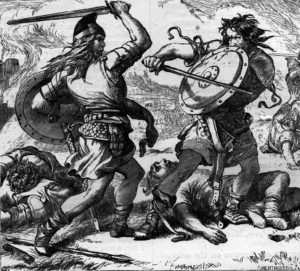
The relationship between Macbeth and Thorfinn Sigurdsson, Earl of Orkney is more than accidental. Thorfinn – known to historians as The Black – was grandson of King Malcolm II and may have been raised in Malcolm’s household. However, he quickly became enemies with Malcolm’s heir Duncan I, who tried to claim the earldom of Caithness on his accession to the throne. Thorfinn bitterly contested Duncan’s claims, and met him in battle at least twice, defeating the King’s forces both times.
Macbeth had a claim to the throne through his wife Grouch, and it is thought that Thorfinn and Macbeth became allies against Duncan. Shortly after the King’s second defeat at Torfness, it is written that Duncan met Macbeth in battle at Pitgaveny on Aug. 15, 1040 and was killed on the battlefield. This is a far cry from being murdered in his bed!
It is possible that after Duncan’s death, Thorfinn and Macbeth managed Scotland jointly, for it is said that at the height of his power, Thorfinn ruled 9 northern earldoms. Historians have written that Macbeth and Thorfinn went to Rome on Pilgrimage together. Some actually believe they were the same person, although I think this is a stretch. Nonetheless, you can read a lively story to this effect in Dorothy Dunnett’s King Hereafter.
It’s possible that Earl Thorfinn Raven-feeder came to Macbeth’s aid during the battle of Dunsinane. He is said to have sailed up the Tay in support of Macbeth, and probably aided the King’s escape from the battle, leaving Malcolm III victor on the field. I write about this at length in my upcoming book, Heir to a Prophecy.
Peter White says:
I found Dorothy Dunnett’s elegant suppositions re this enigmatic period as interesting as any theories trying to unravel the many conundrums that arise in time of Political, Social, Religious and Technological change set against a background of changing climate (sound familiar?).Nigel Tranter of awesome output (I don’t think I’ve read every one but just about.), is more focused on the Romance than the history. This is not to slight the great man. I read them over and over. Dorothy’s historical work, while also romantic, and even a bit soapy perhaps, shows research skills are truly remarkable. Don’t think I’ve come across any of your work, Mercedes, but I’ll surely keep an eye out 🙂
Mercedes Rochelle says:
Thanks, Peter. My newest release, FATAL RIVALRY (about the Sons of Godwine) just came out yesterday!